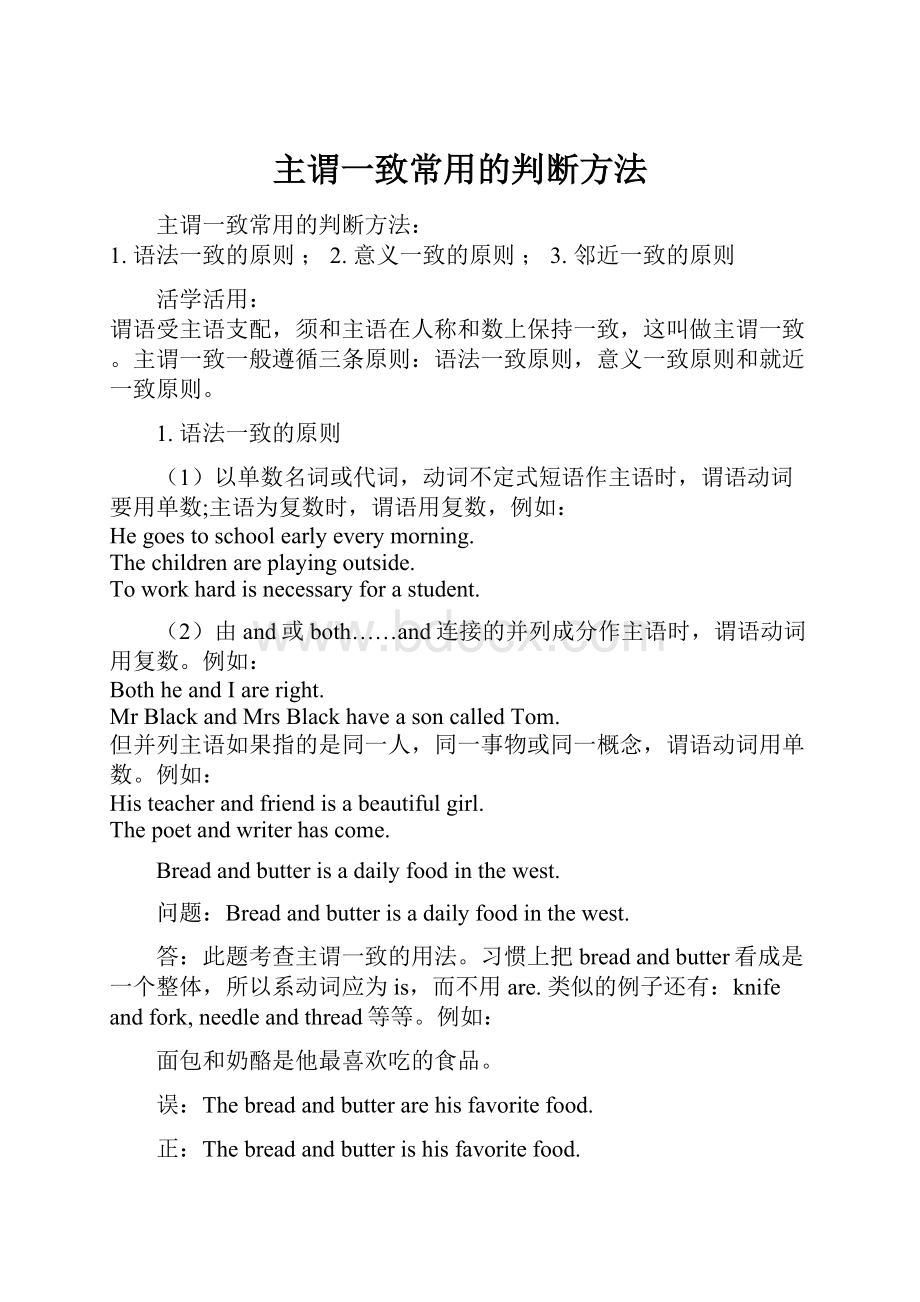主谓一致常用的判断方法.docx
《主谓一致常用的判断方法.docx》由会员分享,可在线阅读,更多相关《主谓一致常用的判断方法.docx(13页珍藏版)》请在冰豆网上搜索。

主谓一致常用的判断方法
主谓一致常用的判断方法:
1. 语法一致的原则;2. 意义一致的原则;3. 邻近一致的原则
活学活用:
谓语受主语支配,须和主语在人称和数上保持一致,这叫做主谓一致。
主谓一致一般遵循三条原则:
语法一致原则,意义一致原则和就近一致原则。
1. 语法一致的原则
(1)以单数名词或代词,动词不定式短语作主语时,谓语动词要用单数;主语为复数时,谓语用复数,例如:
He goes to school early every morning.
The children are playing outside.
To work hard is necessary for a student.
(2)由and或both……and连接的并列成分作主语时,谓语动词用复数。
例如:
Both he and I are right.
Mr Black and Mrs Black have a son called Tom.
但并列主语如果指的是同一人,同一事物或同一概念,谓语动词用单数。
例如:
His teacher and friend is a beautiful girl.
The poet and writer has come.
Bread and butter is a daily food in the west.
问题:
Breadandbutterisadailyfoodinthewest.
答:
此题考查主谓一致的用法。
习惯上把breadandbutter看成是一个整体,所以系动词应为is,而不用are.类似的例子还有:
knifeandfork,needleandthread等等。
例如:
面包和奶酪是他最喜欢吃的食品。
误:
Thebreadandbutterarehisfavoritefood.
正:
Thebreadandbutterishisfavoritefood.
(3)由and连接的并列单数主语之前如果分别由each, every修饰时,其谓语动词要用单数形式。
例如:
In our country every boy and every girl has the right to receive education.
Each man and each woman is asked to help.
(4)主语是单数时,尽管后面跟有 but ,except, besides, with 等介词短语,谓语动词仍用单数。
例如:
The teacher with his students is going to visit the museum.
Nobody but two boys was late for class.
(5) 一些只有复数形式的名词,如people, police, cattle, clothes等作主语时,谓语动词要用复数。
例如:
A lot of people are dancing outside.
The police are looking forthe lost boy.
(6)由each, some, any, no, every 构成的复合代词作主语时,谓语动词都用单数。
例如:
Is everybody ready?
Somebody is using the phone.
(7)有两部分构成的物体的名词,如glasses, shoes, trousers, chopsticks, scissors 等作主语时,谓语动词用复数。
例如:
Where are my shoes?
I can’t find them.
Your trousers are dirty. You’d better change them.
如果这类名词前用了a pair of等,则往往用作单数,谓语动词的单复数形式往往取决于pair的单复数形式。
例如:
Here are some new pairs of shoes.
My new pair of socks is on the bed.
2. 意义一致的原则
(1)表时间、距离、价格、度量衡等的名词作主语时,谓语动词通常用单数。
例如:
Twenty years is not a long time.
Ten dollars is too dear.
(2)有些集合名词,如family, team等作主语时,如作为一个整体看待,谓语动词用单数;如指其中每个成员,
则用复数。
例如:
My family is big one.
My family are watching TV.
(3)不定代词由all, most, more, some, any, none作主语时,也要依这些代词表示的意义来决定谓语动词的单复数形式。
如果代词代表复数可数名词,谓语动词用复数;如果代词代表单数可数名词或不可数名词,谓语动词用单数。
例如:
All of the work has been finished.
All of the people have gone.
(4)疑问代词作主语时,其谓语动词也有两种情况:
主语表示复数意义,谓语动词用复数;主语表示单数意义,则谓语动词用单数。
例如:
Who is your brother?
Who are League members?
(5)“分数或百分数+of+名词”构成的词组作主语时,其谓语动词要以of后面的名词而定。
名词是复数,谓语动词用复数:
名词是单数,谓语动词用单数。
例如:
It is said that 35 per cent of the doctors are women.
Three –fourths of the surface of the earth is sea.
(6)half, the rest等表示不定数量的名词作主语时,如果所指为复数意义,动词用复数;如果所指为单数意义,动词用单数。
例如:
I have read a large part of the book, the rest is more difficult.
Only ten students attended the class because all the rest were off sick.
(7)由what 引导的主语从句作主语时,通常谓语动词用单数形式。
但如果所指内容为复数意义时,谓语动词用复数形式。
例如:
What she said is correct.
What she left me are a few old books.
(8)凡是以“定冠词+形容词(或分词)”作主语,往往根据意义一致的原则决定谓语动词的单复数形式。
如果这种主语指的是一类人,谓语动词用复数;如果指的是一个人或抽象概念,谓语动词用单数形式。
例如:
The sick have been cured and the lost have been found.
The dead is a famous person.
3. 邻近一致的原则
(1)由连词or, either……or, neither……nor, not only…but also,等连接的并列主语,如果一个是单数,一个是复
数,则谓语动词按就近一致原则,与最接近它的主语一致。
例如:
Either you or I am right.
Neither the children nor the teacher knows anything about it.
(2)在“There be” 句型中,谓语动词和最接近的主语一致。
There are two apples and one egg in it.
(3)as well as 和名词连用时,谓语动词和第一个名词相一致。
He as well as I is responsible for it. 不但是我,他对这件事也有责任。
(4)以here开头的句子,其谓语动词和最接近的主语一致。
Here is a letter and some books for you.
中考解析:
()1. How time flies!
Ten years ________ passed.(04年天津)
A. have B. has C. is D. are
()2. Not only his parents but also his brother ________ to the Summer Palace. They haven’t been back.(04年
南通)
A. have been B. have gone C. has been D. has gone
()3. Neither my father ________ going to see the patient.(04年吉林)
A. nor I am B. nor I are C. or me are D. or me is
()4. Look!
There _______ playing with the tourists on Yinhe Square.(04年包头)
A. are a number of deer B. are a number of deers C. is a number of deer D. is a number of deers
实战演练
一. 选择填空
()1. They said the eighteenth and last lesson _______ quite easy.
A. is B. was C. are D. were
()2. ---When are you going to Kunming for your holidays?
---I haven’t decided. ______ this Sunday ______ next Sunday is OK.
A. Both; and B. Either; or C. Neither; nor D. Not only; but also
()3. ______ Helen ______ Joan speaks beautiful Chinese after they came to China.
A. Neither; nor B. Not only; but also C. Both; and D. A and B
()4. _______ of them has his own opinion.
A. Both B. Some C. Every D. Each
()5. Are there any _______ on the farm?
A. horse B. duck C. chicken D. sheep
()6. My shirt _____ white and my trousers _____ blue.
A. are; are B. are; isC. is; is D. is; are
()7. ------Two months _______ quite a long time.
------Yes. I’m afraid that he will miss a lot of lessons.
A. is B. areC. was D. were
()8. The old man has two children but _____ of them lives with him.
A. both B. none C. neither D. all
()9. Our knowledge of computer _____ growing all the time.
A. be B. is C. are D. were
()10. Everyone except Tom and John _____ there when the meeting began.
A. is B. was C. are D. were
()11. Most of the houses _______ this year.
A. has built B. have builtC. has been built D. have been built
()12. I think maths _____ very difficult to learn.
A. is B. are C. has D. have
()13. A large number of students _____ to work in Xingjiang.
A. have gone B. has gone C. goes D. is going
()14. The number of the students in the class ______ small.
A. are B. is C. have D. were
()15. There _____ a lot of good news in today’s newspaper.
A. is B. areC. was D. were
()16.TheGreens____Chinaforfiveyears.(1999甘肃)
A.hasbeeninB.hasbeentoC.havebeeninD.havebeento
()17.Paper____firstinventedinChina.(1999昆明)
A.isB.areC.wasD.were
()18.Listen!
Somebirds____inthetree.(1999广西)
A.issingingB.singsC.singingD.aresinging
()19.There____aneraserunderthedesk.Isityours?
(1999杭州)
A.isB.hasC.wasD.had
()20.There’relotsofEnglishbooks,and____ofthemiseasytounderstand.(99山西)
A.bothB.allC.everyD.each
()21.Betweenthetwobuildings____aschool.
A.lieB.liesC.lyingD.have
()22.There____pencil-box,twobooksandsomeflowersonthedesk.
A.isaB.aresomeC.hasaD.havesome
()23._____theremanyAmericanfriendsintheschoollastFriday?
A.IsB.WasC.AreD.Were
()24.NeitheryounorLinHua____tothegreatWallbefore.
A.havebeenB.hasgoneC.hasbeenD.havebeen
()25.Eachofus____anicepencil-box.
A.haveB.hasC.arehavingD.had
()26.____anyflowersonbothsidesofthestreet?
(1998湖南)
A.IsthereB.ArethereC.HasD.Have
()27.EitherJimorSam____goingtohelpusthisafternoon.
A.wasB.wereC.isD.are
()28.There____agreatmanyaccidentslastyear.
A.wereB.areC.isD.was
()29.Mr.Browntogetherwithhisfamily____justarrivedinXi’an.
A.hasB.haveC.hadD.are
()30.Theold____takengoodcareofinChina.
A.areB.isC.wasD.have
()31.Maths____oneofthe____subjectsinmiddleschool.
A.are;importantB.is;mostimportantC.is;moreimportantD.are;muchimportant
()32.There____anymilkinthebottle.(1997浙江)
A.isB.isn’tC.areD.aren’t
()33.Evenachildknowsthat____aremadeof____.
A.glasses;glassB.glass;glassC.glasses;glassesD.glass;glasses
()34.____thereanumberoffishintheriveratthattime?
A.IsB.AreC.WasD.Were
()35.NotonlytheparentsbutalsoJames____London.Theywillcomebackinamonth。
A.hasbeentoB.havebeentoC.hasgonetoD.havegoneto
()36.Eachmanandeachwoman____bringsomemoneyhere.
A.hasB.haveC.hastoD.haveto
()37.---Howmanychildren____inthepicture?
---Three.
A.hasthereB.isthereC.havethereD.arethere
()38.Sheep____whiteandmilk____white,too.
A.is;isB.are;areC.is;areD.are;is
()39.Milkandbread____myfavouritefoodeverymorning.
A.isB.areC.willbeD.was
()40.____eitheryouorshegoingtotheUnitedStates?
A.IsB.AreC.HaveD.Does
()41.There____apairofshoesonthefloor.Theshoes____mine.
A.are;isB.is;isC.is;areD.are;are
()42.Here____orangeandtwoapplesontheplate.
A.isanB.isaC.aresomeD.hasan
()43.ClassTwo____takingtheirlessonswhentherewasaknockatthedoor.
A.isB.areC.wasD.were
()44.---Noneofthem____agoodcook.---Youareright.Andnoneofyou____goodcooks,either.
A.is;isB.is;areC.are;areD.are;is
()45.Theteacherandwriter____fromAmerica.
A.areB.wereC.isD.come
()46.There____sheepinthefield.(2000辽宁)
A.aremuchB.issmallC.isafewD.isalittle
()47.Thenews____formymother.(2000山西)
A.areB.wereC.beD.is
()48.Morethanamonth____sincetheforeignfriendscamehere.
A.haspassedB.havepassedC.haspastD.havepast
()49.Themotherwithherlittleson____atmyhome____thatsnowynight.
A.were;atB.was;atC.were;onD.was;on
()50.Lindaworkshard,and____.
A.sodoesherbrotherB.sodidherbrotherC.herbrotherdosoD.herbrotherdidso
()51.In1850,aboutathirdofU.S.A______coveredbyforests.
A.wereB.hasbeenC./D.was